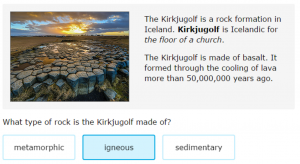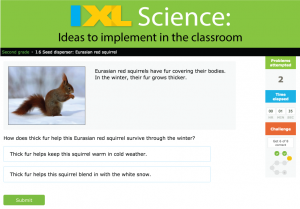As the year draws to a close (already?!) and you begin planning for the upcoming semester, we have some tips on how to get started with IXL’s new science content. IXL is designed for a variety of classroom models and teaching methods, so we’d like to share a few ideas for how to use our new science skills with your class!
To begin a unit
Start off a unit with IXL science! Before you dive into a new topic in class, have students practice the relevant skills on IXL so they can build context and the necessary vocabulary to be fully engaged during instructional or lab time. You can also use IXL to probe for student understanding and then tailor your lessons based on what they already know. Alternatively, start a new topic by going over an IXL skill as a whole class, drawing on the variety of photos, examples, and diagrams to keep students immersed in the material.
In a flipped classroom
Use IXL to support the labs and activities you have planned for class time; IXL science is perfect for both pre- and post-work. Through interactive questions, our skills provide background knowledge and vocabulary to prime students for hands-on experiments and projects. And, afterwards, students can use IXL to solidify their understanding of the scientific concepts they just saw in action.
To differentiate learning
Students often arrive in a classroom with varying levels of background knowledge, especially when it comes to science. With IXL science, you can help all of your students move ahead: a wide range of carefully scaffolded skills helps students fill in gaps or tackle more advanced topics. You can even take advantage of skills in lower grade levels to support English language learners and students with lower reading levels.
 To develop vocabulary and interdisciplinary skills
To develop vocabulary and interdisciplinary skills
On IXL, students learn and practice scientific vocabulary in context, which also helps them transfer this vocabulary to other disciplines, such as reading comprehension or writing activities. You can use IXL science to develop other interdisciplinary skills too, as students will practice logic, reasoning, and data analysis throughout. And IXL science pairs nicely with social studies lessons because many of the skills feature climates, plants, animals, and geological formations from around the world, giving students exposure to different regions and cultures.
